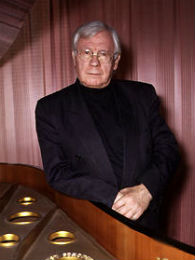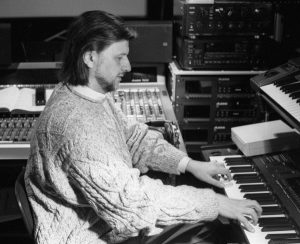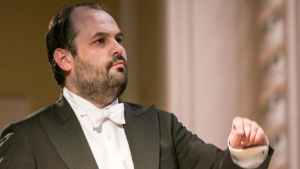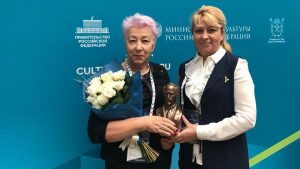Yuri Rozum: “Performing is always a dialogue between a musician and a hall”
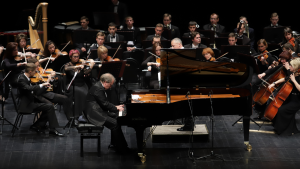 Pianist, People’s Artist of Russia, Professor and Teacher of the Gnessins Russian Academy of Music and the A.G. Schnittke told Kultura.RF portal that it’s a “dog business” in music, why it’s useful to stand on the head before going on stage and what musical compositions of Russian composers are undervalued in the West.
Pianist, People’s Artist of Russia, Professor and Teacher of the Gnessins Russian Academy of Music and the A.G. Schnittke told Kultura.RF portal that it’s a “dog business” in music, why it’s useful to stand on the head before going on stage and what musical compositions of Russian composers are undervalued in the West.
– This year marks 45 years of your creative activity. How did you begin your journey in music? Who were your teachers?
– We can say that the journey began in the womb, because my mother Galina Rozhdestvenskaya is a musician, chief conductor and choirmaster of the Academic Choir of the Russian Song of the Radio and Television, and Pope Alexander Rosum is a famous baritone singer, People’s Artist of the RSFSR. Therefore, I grew up in an absolutely musical cradle. I loved to sing, but did not hit the notes at all. And my parents were not going to make a musician out of me. Later, however, it turned out at random that I have absolute pitch. This happens when the hearing is very thin, but there is no coordination with the voice. As a result, they began to learn – at the age of five and a half I began to study music, and at six I started to perform with dad at concerts, accompanied very simple songs like Neapolitan. Then a year at the preparatory school at the Gnessins’ Institute – only she beat me off the whole hunt for music.
Then I entered the Central Music School – the Central Music School at the Moscow Conservatory. I got into the class of an absolutely brilliant teacher – Anna Danilovna Artobolevskaya. I remember that on the first day I lost the whole four hours on the piano, although I had hardly been hatching for 15 minutes before. And in the classroom with her, it was precisely the desire to become a professional musician. Although I couldn’t say that I was very excited when I did classes, rather, musical accumulation took place, which then resulted in a desire to “work” on the piano. For the last three years, by decision of the examination committee, the Central Music School has already transferred to the specialty class at the Conservatory – to Associate Professor Yevgeny Malinin. And when he entered the Conservatory, he continued to study under his leadership. Then there was a graduate school – with Professor Lev Naumov. Both Evgeny Vasilyevich and Lev Nikolayevich were pupils and followers of the great Heinrich Neuhaus. So began my way and my school.
– How many years in general is recruited?
– The learning process is endless. All life is a school, I am still learning something. Purely formally – let’s calculate: first the annual null from six years, then 11 years at school, five years at the conservatory and three years of graduate school – 20. And why do I say that 45 years is on stage, – I’m counting off from the first concert with dad. As a second year student at the Conservatory, I played my first concert in Moscow. It was the philharmonic site of the Central House of Scientists. I accompanied father to romances of Tchaikovsky and Rachmaninov.
– Remember your first tour? What impression did they make?
– In the third year I was selected for the Queen Elizabeth International Competition in Brussels – one of the most prestigious at that time. I passed on him the first number and had to be well prepared. I was even exempted from classes at the Conservatory. Then “Soyuzkontsert” organized tours for those who went to serious reviews. This was done so that we beat our numbers on small programs. Soon I received an invitation for such a preparatory tour to Yerevan. In the newly rebuilt Chamber Music Hall, I was the soloist. Although there were few people, it was shaking like an autumn leaf.
Paradoxically, five years ago I found myself again in this cozy building. Then, in honor of the 40th anniversary of the stage activity, my German manager gave me a European tour. And since he is an Armenian himself, he has scheduled one anniversary concert in Yerevan. He asked me in what hall I would like to hold this concert – referring, of course, to the halls of the conservatory or the philharmonic. But I chose the smallest chamber hall. This time he was already full of – in all the aisles were standing, sitting. It was so touching – after years to come back. A little shabby hall, an old piano, but my soul was elated. Such is the connection of times.
– Tell me, what kind of music of domestic classics do the foreign public always meet willingly? Is it possible to identify absolute favorites in certain countries?
– I think no. Everywhere our leading composers of the XIX – early XX century – Mussorgsky, Tchaikovsky, Rachmaninov, Scriabin – are equally popular. They are followed by Shostakovich, Prokofiev, Stravinsky (if you count him Russian, he is in fact an international composer). To a lesser extent – our wonderful Glinka, Rimsky-Korsakov and Taneyev. In general, I can say that Asia is more fixated on Tchaikovsky and Rachmaninov. From year to year, they can go there to “Swan Lake” or “Sleeping Beauty” – in the same performance, on the same stage; listen, have fun and do not look for some new ways. They have their own passions: for example, in Japan, Chopin is the number one composer. But Europe is more exacting and is not content with the same thing, asks for something new.
